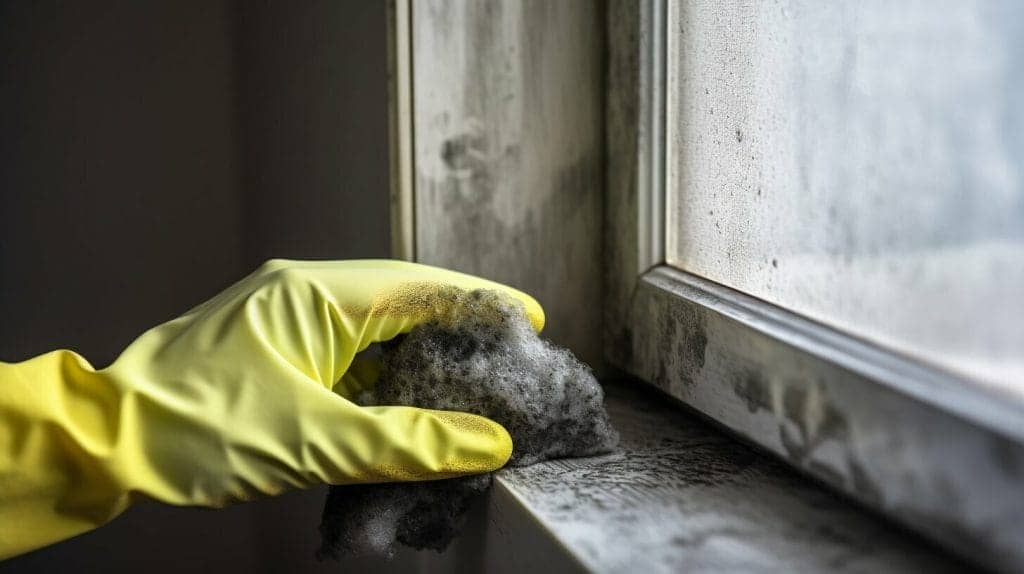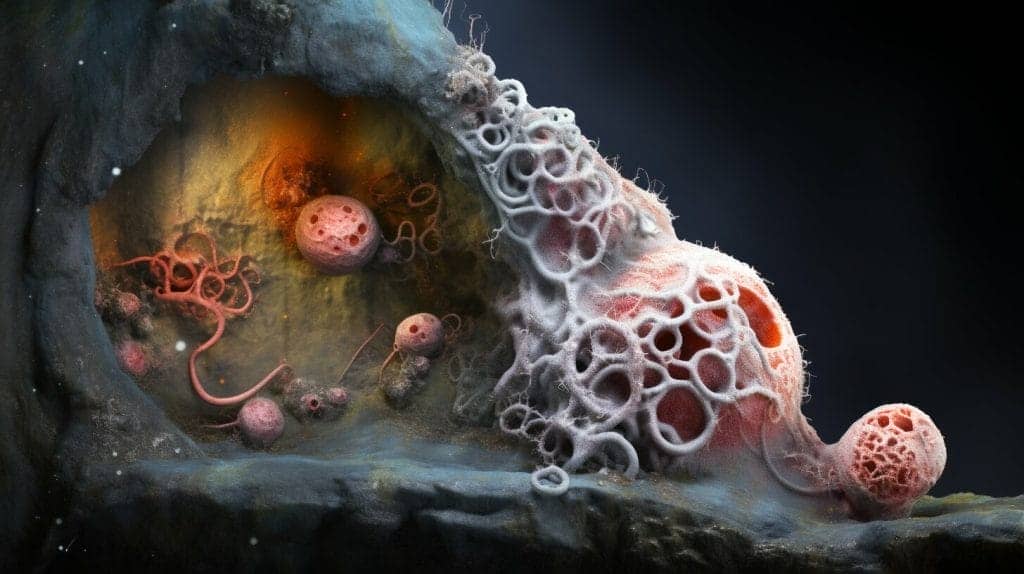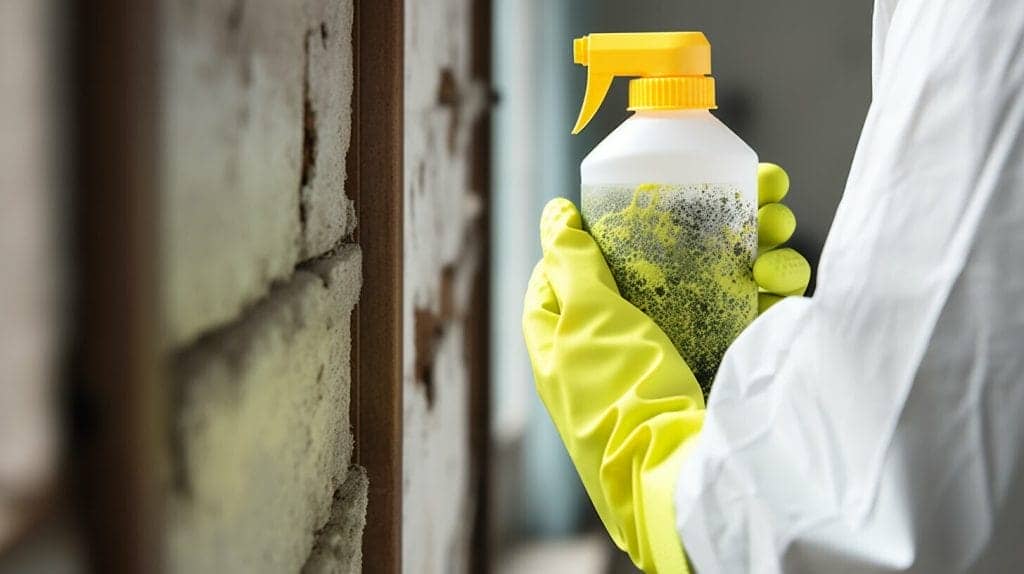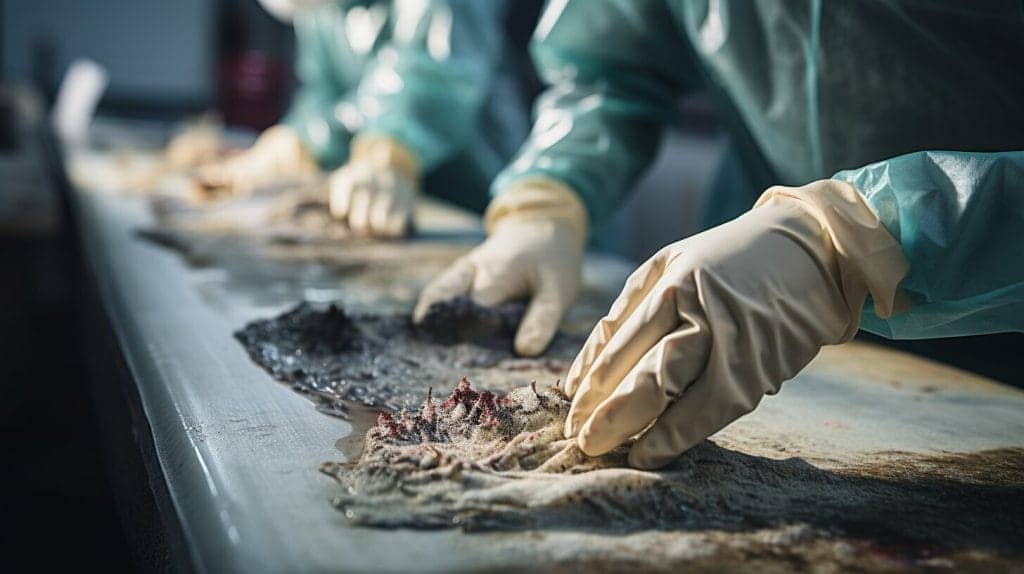Mycotoxins are toxic substances produced by certain types of fungi that can contaminate food, water, and indoor environments. Exposure to mycotoxins has been linked to various health problems, including cancer, respiratory diseases, and neurological disorders. Recent research has shown that mycotoxins can also trigger epigenetic changes that may contribute to the development of these conditions.
Epigenetic modifications are alterations in gene expression that do not involve changes to the underlying DNA sequence. These modifications can be influenced by environmental factors, such as mycotoxin exposure, and can have long-lasting effects on health. Understanding the relationship between mycotoxins and epigenetic changes is crucial for developing effective prevention and treatment strategies for mycotoxin-related health issues.
Key Takeaways:
- Mycotoxins are toxic substances produced by certain types of fungi that can contaminate food, water, and indoor environments.
- Mycotoxin exposure can trigger epigenetic changes that may contribute to the development of various health conditions.
- Epigenetic modifications can have long-lasting effects on health and are influenced by environmental factors.
- Understanding the relationship between mycotoxins and epigenetic changes is crucial for developing effective prevention and treatment strategies for mycotoxin-related health issues.
Understanding Epigenetic Modifications Caused by Mycotoxins
Mycotoxins are known to induce epigenetic modifications, which can alter the expression of genes and impact various biological functions. One of the most studied mechanisms by which mycotoxins cause epigenetic changes is through DNA methylation, a process that involves the addition of a methyl group to the cytosine base of DNA molecules.
This modification can affect gene expression by inhibiting DNA transcription or binding of transcription factors to regulatory regions, thereby modulating the activity of certain genes. Apart from DNA methylation, mycotoxin exposure has also been linked to histone modifications, which can alter chromatin structure and gene accessibility. In addition, mycotoxins can affect the activity of enzymes involved in the maintenance of epigenetic marks, such as DNA methyltransferases and histone deacetylases.
Epigenetic effects of mycotoxin exposure have been reported in various biological systems, including animal and cell models, as well as in humans exposed to mycotoxins through contaminated food or indoor environments. Some of the genes that are influenced by mycotoxin-induced epigenetic changes are involved in immune function, lipid metabolism, and cancer development. The extent and duration of these effects may depend on various factors, such as the type and dose of mycotoxin, the timing and duration of exposure, and individual susceptibility.
Impact of Mycotoxins on Gene Expression
Mycotoxin exposure can induce epigenetic alterations, which in turn can impact gene expression. Epigenetic changes can alter the structure of DNA and affect gene regulation without changing the DNA sequence itself. Mycotoxins such as aflatoxin B1, fumonisin B1, and ochratoxin A have been shown to cause DNA methylation, histone modifications and miRNA alterations, which can lead to changes in gene expression.
Studies have shown that mycotoxin-induced alterations in gene expression can contribute to various health conditions. Epigenetic changes caused by mycotoxin exposure have been linked to the development of cancer, neurological disorders, respiratory problems, and more. For example, exposure to aflatoxin B1 has been associated with an increased risk of liver cancer, while fumonisin B1 has been linked to neural tube defects in newborns.
It is important to note that mycotoxin-induced epigenetic changes do not always result in negative health outcomes. Some epigenetic modifications may be protective and aid in adaptation to environmental stressors or protect against various diseases.
However, when combined with other environmental factors, genetic predisposition, and other lifestyle factors, the effects of mycotoxin-induced epigenetic changes may contribute to chronic disease development. Therefore, it is crucial to detect and manage mycotoxin exposure and related epigenetic changes to prevent potential health risks.
Epigenetic Alterations Induced by Mycotoxins
| Mycotoxin | Epigenetic Effects |
|---|---|
| Aflatoxin B1 | DNA methylation, histone modifications |
| Fumonisin B1 | DNA methylation, histone modifications, miRNA alterations |
| Ochratoxin A | DNA methylation, histone modifications, miRNA alterations |
Table 1: Epigenetic alterations induced by common mycotoxins.
Disease Risks Associated with Mycotoxin-Induced Epigenetic Changes
Mycotoxin-induced epigenetic changes have been linked to a range of health risks and diseases, making it essential to understand the potential impact of mycotoxin exposure on the human body.
One of the most significant risks associated with mycotoxin-induced epigenetic changes is cancer. Studies have shown that mycotoxin exposure can lead to alterations in DNA methylation and other epigenetic mechanisms, which can result in changes in gene expression that contribute to the development of cancer.
Other health risks associated with mycotoxin exposure include respiratory problems, neurological disorders, and immune system dysfunction. Mycotoxins can also contribute to the development of allergies and autoimmune disorders by altering the immune system’s function.
In pregnant women, mycotoxin exposure can lead to complications such as miscarriage, stillbirth, and congenital disabilities, including neural tube defects and intellectual disabilities.
Examples of Diseases and Conditions Associated with Mycotoxin Exposure
| Disease/Condition | Description |
|---|---|
| Cancer | Mycotoxin exposure can cause epigenetic changes that contribute to the development of cancer. |
| Respiratory problems | Mycotoxins can cause inflammation and respiratory distress, leading to conditions such as asthma and chronic obstructive pulmonary disease (COPD). |
| Neurological disorders | Mycotoxins have been linked to various neurological disorders, including Alzheimer’s disease, Parkinson’s disease, and multiple sclerosis. |
| Allergies and autoimmune disorders | Mycotoxins can trigger immune system dysfunction, leading to allergies and autoimmune disorders such as rheumatoid arthritis and lupus. |
| Pregnancy complications | Mycotoxin exposure during pregnancy can result in a range of complications, such as miscarriage, stillbirth, and congenital disabilities. |
It is essential to address mycotoxin exposure and associated risks, particularly for individuals who are at higher risk due to pre-existing conditions, occupational exposure, or susceptibility to allergies and respiratory problems.
Preventive Measures to Minimize Mycotoxin Exposure
Mycotoxins are a common problem in many homes and workplaces, and exposure to these toxins can have serious health implications. However, there are several measures you can take to minimize your exposure and reduce the risk of developing health issues related to mycotoxin-induced epigenetic changes. Here are some preventive measures you can implement:
- Keep your home dry and well-ventilated: Mold thrives in damp environments, so it’s essential to keep your living spaces dry. Use dehumidifiers in areas with high humidity and ensure adequate ventilation throughout your home. Be sure to fix any leaks or water damage promptly to prevent mold growth.
- Inspect your home for mold: Regularly check your home, particularly in areas with water sources like bathrooms and kitchens, for signs of mold growth. If you detect mold, immediately remove it by following appropriate remediation methods.
- Use air purifiers: Air purifiers with HEPA filters can help remove mold spores and other airborne toxins from the air, reducing your exposure to mycotoxins.
- Store food correctly: Mycotoxins can contaminate food, so it’s essential to store food correctly. Keep your food in dry, airtight containers away from moisture and inspect it for signs of mold growth before consumption.
- Wear protective gear: When cleaning mold or working in areas that may expose you to mycotoxins, wear appropriate protective gear like gloves, masks, and goggles.
- Monitor indoor air quality: Use indoor air quality monitors to detect and track potential contaminates like mycotoxins. These monitors can help you detect problems before they become severe.
- Consider professional inspections: Periodically, consider hiring a professional to inspect your home for mold and other contaminants. These experts have the tools and experience to detect problems before they become severe.
By following these preventive measures, you can minimize your exposure to mycotoxins and reduce the risk of developing health issues related to mycotoxin-induced epigenetic changes. Remember to take early action if you detect mold or suspect exposure to mycotoxins as early action is essential to minimize potential health issues.
Holistic Treatments at Oasis Medical Institute
Oasis Medical Institute in Tijuana, MX offers a range of holistic treatments that address mycotoxin-induced epigenetic changes and mold toxicity. Led by Dr. Francisco Contreras MD, their team of experts uses an integrative approach to provide patients with personalized treatment plans that combine conventional and complementary therapies, nutrition, and lifestyle changes.
At Oasis Medical Institute, they understand the importance of addressing not only the physical symptoms of mold toxicity but also the underlying causes, such as mycotoxin-induced epigenetic changes. Their holistic treatment program includes various modalities, such as:
| Therapy | Description |
|---|---|
| Hyperbaric Oxygen Therapy | A non-invasive therapy that delivers high levels of oxygen to the body to promote healing and reduce inflammation. |
| IV Nutrient Therapy | A treatment that delivers vitamins, minerals, and other nutrients directly into the bloodstream, bypassing the digestive system to maximize absorption. |
| Detoxification | Through a combination of sauna therapy, liver support, and other modalities, the body is supported in the elimination of toxins. |
With a focus on individualized treatment plans, the team at Oasis Medical Institute works closely with patients to identify their unique needs and tailor their treatment accordingly. They also provide ongoing support to help patients maintain their epigenetic health long after their treatment program has ended.
Book a Consultation
If you are concerned about mold toxicity or mycotoxin-induced epigenetic changes, Oasis Medical Institute can help. To book a consultation and learn more about their holistic Mold Toxicity treatment program, call 866-868-1992.
Integrative Approach to Mold Toxicity Treatment
Oasis Medical Institute takes an integrative approach to medicine for mold toxicity, offering a holistic Mold Toxicity treatment program for patients. They believe that by utilizing both conventional and complementary therapies, patients can receive a more comprehensive and targeted treatment plan.
Their integrative approach includes a range of modalities such as nutrition, lifestyle changes, and other complementary therapies. The program is tailored to the individual needs of the patient, ensuring that the treatment plan is customized to the specific conditions and symptoms they are experiencing.
Combination of Conventional and Complementary Therapies
Oasis Medical Institute combines conventional approaches with complementary therapies to provide a well-rounded and individualized treatment plan. This integrative approach includes medications, supplements, and other conventional treatments alongside complementary therapies such as acupuncture, massage, and yoga.
Their holistic Mold Toxicity treatment program aims to address the root causes of mold toxicity and epigenetic changes, rather than just treating the symptoms. By treating the whole person and not just the disease, patients are given the tools to reclaim their health and improve their overall well-being.
Tailored to Each Patient’s Unique Needs
Oasis Medical Institute recognizes that each patient’s experience with mold toxicity and epigenetic changes is unique. Therefore, their integrative approach is tailored to the individual needs of the patient.
They take a personalized approach to treatment, utilizing a range of diagnostic tests to identify the underlying causes of the patient’s condition. These can include blood tests, urine tests, and other diagnostic tools to gain insights into the patient’s unique biochemical makeup.
Call Today to Learn More
If you are interested in learning more about the holistic Mold Toxicity treatment program at Oasis Medical Institute, call 866-868-1992 to schedule a consultation. Their team of experts, led by Dr. Francisco Contreras MD, can help you navigate the complexities of mold toxicity and epigenetic changes and create a personalized treatment plan that addresses your unique needs.
Importance of Individualized Treatment Plans
When it comes to treating mold toxicity and mycotoxin-induced epigenetic changes, it is essential to develop an individualized treatment plan that addresses the unique needs and conditions of each patient. This approach takes into account various factors, such as the type and severity of symptoms, the extent of mycotoxin exposure, and the patient’s overall health and lifestyle.
With an individualized treatment plan, patients can receive tailored care that targets specific areas of concern, such as detoxification, immune support, and nutritional deficiencies. This approach can be particularly beneficial for patients with complex health conditions or chronic illnesses, as it allows for a more comprehensive and holistic approach to treatment.
At Oasis Medical Institute, Dr. Francisco Contreras MD and his team of experts use a personalized approach to mold toxicity treatment, incorporating conventional and complementary therapies to address the root causes of the condition. This approach can help patients achieve optimal health and wellness, and minimize the impact of mycotoxin-induced epigenetic changes on their long-term health.
Book a Consultation at Oasis Medical Institute
If you suspect that you have been exposed to mycotoxins or are experiencing symptoms related to mold toxicity, book a consultation with the experts at Oasis Medical Institute. They offer a holistic Mold Toxicity treatment program that can help you address the underlying causes of your health issues and restore your well-being.
To learn more about their services and schedule a consultation, call 866-868-1992 today.
Understanding the Long-Term Health Effects of Mycotoxin Exposure
Mycotoxin exposure can have significant long-term health effects, particularly when it comes to epigenetic changes. As discussed in earlier sections, mycotoxins can cause modifications to DNA and other epigenetic mechanisms that can lead to altered gene expression and a range of health issues.
Over time, the cumulative impact of mycotoxin exposure can increase the risk of developing chronic conditions and diseases, such as cancer, neurological disorders, and respiratory problems. Additionally, the effects of mycotoxin-induced epigenetic changes may not be immediately apparent and can take years to manifest.
As a result, it is crucial for individuals who have been exposed to mycotoxins to monitor their health closely and seek ongoing medical care. An integrative approach to treatment can help address both the short-term and long-term effects of mycotoxin exposure, and minimize the risk of developing chronic health issues.
Current Research on Mycotoxin-Induced Epigenetic Changes
There is ongoing research exploring the mechanisms and implications of mycotoxin-induced epigenetic changes. Recent studies have focused on specific mycotoxins, such as aflatoxins and ochratoxins, and their impact on epigenetic modifications, such as DNA methylation and histone modifications.
One study found that exposure to aflatoxin B1 led to epigenetic alterations in genes associated with cancer, inflammation, and immune response. Another study found that ochratoxin A exposure altered histone modifications and gene expression in liver cells.
Further research is needed to fully understand the epigenetic mechanisms influenced by mycotoxins and their impact on health. Some researchers are also exploring potential interventions, such as targeted therapies, that can mitigate the impact of mycotoxin-induced epigenetic changes.
Promising Preventive Measures and Therapeutic Approaches
Mycotoxin-induced epigenetic changes can have serious health implications, making the identification of effective prevention and treatment strategies critical. As the research in this field evolves, promising preventive measures and therapeutic approaches are emerging.
Targeted Therapies
Targeted therapies that aim to restore normal epigenetic modifications are being explored as potential treatments for mycotoxin-induced epigenetic changes. These medications could target specific genes, proteins, or enzymes related to the epigenetic mechanisms influenced by mycotoxins. However, more research is needed to develop and assess the efficacy and safety of these treatments.
Lifestyle Modifications
Simple lifestyle modifications such as improving diet, exercise, and sleep habits can help support healthy epigenetic function and minimize the impact of mycotoxin exposure. A healthy, nutrient-rich diet rich in antioxidants and anti-inflammatory compounds can help reduce oxidative stress and inflammation, while regular exercise can promote healthy gene expression. Stress reduction techniques such as meditation and yoga can also help, as chronic stress can negatively impact epigenetic regulation.
Environmental Toxin Avoidance
Avoiding exposure to environmental toxins can play an important role in reducing mycotoxin exposure and its associated health risks. It is important to take measures to prevent and remediate mold growth in indoor spaces, maintain good indoor air quality, and reduce exposure to other environmental toxins like pesticides, herbicides, and industrial chemicals.
The promising preventive measures and therapeutic approaches discussed above provide hope for those experiencing mycotoxin-induced epigenetic changes. Personalized treatment plans that incorporate these interventions can help patients achieve optimal health outcomes and improve their quality of life.
The Role of Epigenetic Testing in Mycotoxin Exposure
Epigenetic testing is a valuable tool in assessing the impact of mycotoxin exposure on an individual’s health. By analyzing the epigenetic modifications induced by mycotoxins, healthcare providers can gain important insights into a patient’s risk for various health conditions and tailor treatments accordingly.
The role of epigenetic testing in mycotoxin exposure is particularly significant given the complex mechanisms through which mycotoxins cause epigenetic changes. These modifications can affect gene expression and contribute to a range of health outcomes, including cancer, neurological disorders, and respiratory problems.
Epigenetic testing can also help identify individuals who may be more vulnerable to mycotoxin-related health risks due to genetic variations or underlying health conditions. For example, individuals with certain gene mutations may be more susceptible to the effects of mycotoxins on gene expression and may require more aggressive treatment.
While epigenetic testing is a promising tool for evaluating mycotoxin exposure, there are limitations to its use. The field of epigenetics is complex and rapidly evolving, and more research is needed to fully understand the relationship between mycotoxin exposure, epigenetic changes, and health outcomes. Additionally, epigenetic testing may not be accessible or affordable for all patients.
Despite these limitations, epigenetic testing is a valuable component of a comprehensive approach to mycotoxin-related health risks. By providing insights into an individual’s epigenetic profile, healthcare providers can take a personalized approach to treatment, minimizing the impact of mycotoxin exposure on health outcomes.
Holistic Lifestyle Practices to Support Epigenetic Health:
Aside from medical treatments, there are also practical holistic lifestyle practices that individuals can adopt to support epigenetic health and minimize the impact of mycotoxin exposure. These practices can also contribute to overall well-being and promote healthy gene expression.
Dietary Modifications:
One of the most effective ways to support epigenetic health is through dietary modifications. Consuming a variety of nutrient-rich whole foods such as vegetables, fruits, lean proteins, and healthy fats can go a long way in supporting gene expression. Research suggests that specific foods can also help to mitigate the impact of mycotoxins on the epigenome, such as cruciferous vegetables, berries, green tea, garlic, and turmeric. Reducing the intake of processed and packaged foods, refined sugar, and alcohol can also support epigenetic health.
Stress Management:
Chronic stress can contribute to epigenetic changes that impact gene expression. Engaging in stress-reducing practices such as meditation, yoga, deep breathing exercises, and regular exercise can help to mitigate these effects. It’s also important to prioritize rest and sleep to reduce stress hormones and promote cellular repair.
Environmental Toxin Avoidance:
Avoiding exposure to environmental toxins such as pesticides, heavy metals, and pollutants can help to minimize the impact of mycotoxins on the epigenome. This includes choosing organic produce, investing in a high-quality air purifier, and avoiding the use of harsh chemicals in the home.
Physical Activity:
Regular physical activity can also promote healthy gene expression by reducing inflammation, enhancing cellular energy, and supporting detoxification processes. Engaging in moderate-intensity exercise such as brisk walking, swimming, or cycling for 30 minutes per day can provide significant benefits.
Conclusion:
While mycotoxin-induced epigenetic changes can contribute to various health risks and diseases, adopting holistic lifestyle practices can support epigenetic health. These practices can also contribute to overall well-being, promote healthy gene expression, and minimize the impact of mycotoxin exposure. Combining medical treatments with holistic lifestyle modifications can provide the most comprehensive approach to addressing mycotoxin-related health concerns.
Conclusion
Overall, the impact of mycotoxin-induced epigenetic changes on health is a rapidly evolving area of research. It is becoming increasingly clear that exposure to mycotoxins can cause significant alterations in epigenetic mechanisms, leading to changes in gene expression and an increased risk of various health conditions and diseases.
Early detection, prevention, and individualized treatment approaches are crucial in addressing the health risks associated with mycotoxin exposure. Holistic treatments, such as those offered at Oasis Medical Institute, incorporate both conventional and complementary therapies, nutrition, lifestyle changes, and other modalities to promote healing and restore balance.
As research in this field continues to evolve, it is essential to remain vigilant of the potential long-term health effects of mycotoxin exposure and to take proactive measures to support epigenetic health. By adopting holistic lifestyle practices, maintaining healthy indoor environments, and seeking individualized treatment when necessary, individuals can minimize the impact of mycotoxin-induced epigenetic changes and promote overall well-being.
FAQ
Q: What are mycotoxin-induced epigenetic changes?
A: Mycotoxin-induced epigenetic changes refer to alterations in gene expression and DNA modifications that are caused by exposure to mycotoxins, toxic compounds produced by certain molds.
Q: How do mycotoxins cause epigenetic modifications?
A: Mycotoxins can induce epigenetic modifications, such as DNA methylation, by interfering with the normal regulation of gene expression. They can disrupt the epigenetic machinery and lead to changes in gene activity.
Q: What is the significance of mycotoxin-related epigenetic modifications?
A: Mycotoxin-related epigenetic modifications have been implicated in various health conditions and diseases. They can affect crucial cellular processes and contribute to the development of cancer, neurological disorders, respiratory problems, and other health issues.
Q: How can mycotoxin exposure impact gene expression?
A: Mycotoxin exposure can alter gene expression by modifying the epigenetic marks on DNA, such as DNA methylation and histone modifications. These changes can lead to aberrant gene regulation and affect cellular functions.
Q: What are the disease risks associated with mycotoxin-induced epigenetic changes?
A: Mycotoxin-induced epigenetic changes have been linked to an increased risk of cancer, neurological disorders, respiratory problems, and other health conditions. The specific risks depend on the type and duration of mycotoxin exposure.
Q: What are some preventive measures to minimize mycotoxin exposure?
A: To minimize mycotoxin exposure, it is important to prevent and remediate mold growth in indoor environments, ensure proper food storage and handling, and maintain good indoor air quality. These measures can help reduce the risk of mycotoxin-related health issues.
Q: What holistic treatments are available at Oasis Medical Institute for mycotoxin-induced epigenetic changes?
A: Oasis Medical Institute in Tijuana, MX offers holistic treatments for mold toxicity and mycotoxin-induced epigenetic changes. Dr. Francisco Contreras MD, an expert in this field, provides integrative approaches to address these health concerns.
Q: What is the integrative approach to mold toxicity treatment at Oasis Medical Institute?
A: The integrative approach used by Oasis Medical Institute combines conventional and complementary therapies, nutrition, lifestyle changes, and other modalities. This holistic Mold Toxicity treatment program aims to address the underlying causes and support patients’ overall health and well-being.
Q: Why is an individualized treatment plan important in dealing with mold toxicity and mycotoxin-induced epigenetic changes?
A: An individualized treatment plan is crucial because each person may respond differently to mycotoxin exposure and epigenetic changes. Tailoring treatments to individual needs and conditions can optimize outcomes and minimize potential risks.
Q: How can I book a consultation at Oasis Medical Institute for mold toxicity concerns?
A: To book a consultation at Oasis Medical Institute and inquire about their holistic Mold Toxicity treatment program, please call 866-868-1992.
Q: What are the long-term health effects of mycotoxin exposure and epigenetic changes?
A: Mycotoxin exposure and epigenetic changes can have long-term health effects, including an increased risk of chronic diseases and the cumulative impact on overall well-being. Ongoing monitoring and treatment may be necessary to mitigate these effects.
Q: What is the current research on mycotoxin-induced epigenetic changes?
A: There is ongoing research on mycotoxin-induced epigenetic changes, with studies focusing on understanding the mechanisms involved, identifying biomarkers, and exploring potential therapeutic interventions. Recent findings contribute to expanding our knowledge in this area.
Q: Are there promising preventive measures and therapeutic approaches for mycotoxin-induced epigenetic changes?
A: Promising preventive measures and therapeutic approaches are being explored to mitigate the impact of mycotoxin-induced epigenetic changes. Targeted therapies, lifestyle modifications, and other interventions show potential in managing and addressing these health concerns.
Q: What is the role of epigenetic testing in assessing mycotoxin exposure?
A: Epigenetic testing can help assess the impact of mycotoxin exposure on an individual’s health by analyzing specific epigenetic marks. It can provide valuable insights into the effects of mycotoxins and aid in developing personalized treatment strategies.
Q: What are some holistic lifestyle practices to support epigenetic health and minimize mycotoxin exposure?
A: Holistic lifestyle practices that can support epigenetic health and minimize mycotoxin exposure include adopting a healthy diet, managing stress, engaging in regular exercise, and avoiding environmental toxins. These practices contribute to overall well-being.
Dr. Francisco Contreras, MD is a renowned integrative medical physician with over 20 years of dedicated experience in the field of integrative medicine. As the Medical Director of the Oasis of Hope Hospital in Tijuana, Mexico, he has pioneered innovative treatments and integrative approaches that have been recognized globally for the treatment of cancer, Lyme Disease, Mold Toxicity, and chronic disease using alternative treatment modalities. Dr. Contreras holds a medical degree from the Autonomous University of Mexico in Toluca, and speciality in surgical oncology from the University of Vienna in Austria.
Under his visionary leadership, the Oasis of Hope Hospital has emerged as a leading institution, renowned for its innovative treatments and patient-centric approach for treating cancer, Lyme Disease, Mold Toxicity, Long-Haul COVID, and chronic disease. The hospital, under Dr. Contreras's guidance, has successfully treated thousands of patients, many of whom traveled from different parts of the world, seeking the unique and compassionate care the institution offers.
Dr. Contreras has contributed to numerous research papers, articles, and medical journals, solidifying his expertise in the realm of integrative medicine. His commitment to patient care and evidence-based treatments has earned him a reputation for trustworthiness and excellence. Dr. Contreras is frequently invited to speak at international conferences and has been featured on CNN, WMAR2 News, KGUN9 News, Tyent USA, and various others for his groundbreaking work. His dedication to the medical community and his patients is unwavering, making him a leading authority in the field.
Contreras has authored and co-authored several books concerning integrative therapy, cancer, Lyme Disease and heart disease prevention and chronic illness, including "The Art Science of Undermining Cancer", "The Art & Science of Undermining Cancer: Strategies to Slow, Control, Reverse", "Look Younger, Live Longer: 10 Steps to Reverse Aging and Live a Vibrant Life", "The Coming Cancer Cure Your Guide to effective alternative, conventional and integrative therapies", "Hope Medicine & Healing", "Health in the 21st Century: Will Doctors Survive?", "Healthy Heart: An alternative guide to a healthy heart", “The Hope of Living Cancer Free”, “Hope Of Living Long And Well: 10 Steps to look younger, feel better, live longer” “Fighting Cancer 20 Different Ways”, "50 Critical Cancer Answers: Your Personal Battle Plan for Beating Cancer", "To Beat . . . Or Not to Beat?", and “Dismantling Cancer.”






















